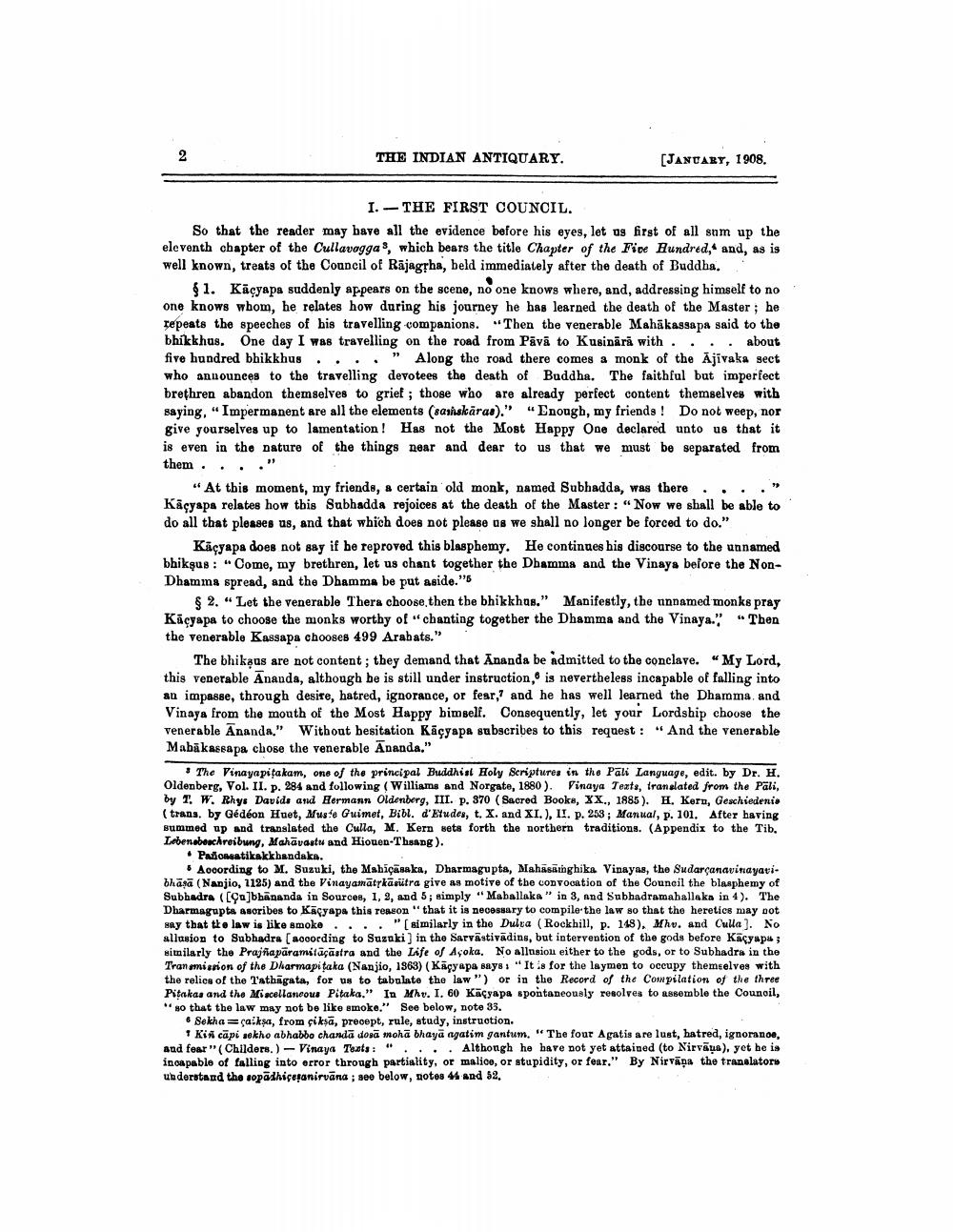Book Title: Indian Antiquary Vol 37 Author(s): Richard Carnac Temple Publisher: Swati Publications View full book textPage 8
________________ 2 THE INDIAN ANTIQUARY. [JANUARY, 1908. I. THE FIRST COUNCIL. So that the reader may have all the evidence before his eyes, let us first of all sum up the eleventh chapter of the Cullavaggas, which bears the title Chapter of the Five Hundred, and, as is well known, treats of the Council of Rajagṛha, beld immediately after the death of Buddha. §1. Kaçyapa suddenly appears on the scene, no one knows where, and, addressing himself to no one knows whom, he relates how during his journey he has learned the death of the Master; he repeats the speeches of his travelling companions. Then the venerable Mahakassapa said to the bhikkhus. One day I was travelling on the road from Pāvā to Kusinārā with .... about five hundred bhikkhus . " Along the road there comes a monk of the Ajivaka sect who announces to the travelling devotees the death of Buddha. The faithful but imperfect brethren abandon themselves to grief; those who are already perfect content themselves with saying, "Impermanent are all the elements (saskāras)." "Enough, my friends! Do not weep, nor give yourselves up to lamentation! Has not the Most Happy One declared unto us that it is even in the nature of the things near and dear to us that we must be separated from them...." "At this moment, my friends, a certain old monk, named Subhadda, was there Kaçyapa relates how this Subhadda rejoices at the death of the Master: "Now we shall be able to do all that pleases us, and that which does not please us we shall no longer be forced to do." Kaçyapa does not say if he reproved this blasphemy. He continues his discourse to the unnamed bhiksus: "Come, my brethren, let us chant together the Dhamma and the Vinays before the NonDhamma spread, and the Dhamma be put aside."s § 2. "Let the venerable Thera choose, then the bhikkhus." Manifestly, the unnamed monks pray Kaçyapa to choose the monks worthy of "chanting together the Dhamma and the Vinaya." "Then the venerable Kassapa chooses 499 Arabats." The bhikaus are not content; they demand that Ananda be admitted to the conclave. "My Lord, this venerable Ananda, although he is still under instruction, is nevertheless incapable of falling into an impasse, through desire, hatred, ignorance, or fear, and he has well learned the Dhamma, and Vinaya from the mouth of the Most Happy himself. Consequently, let your Lordship choose the venerable Ananda." Without hesitation Kaçyapa subscribes to this request: "And the venerable Mabakassapa chose the venerable Ananda." The Vinayapiṭakam, one of the principal Buddhist Holy Scriptures in the Pali Language, edit. by Dr. H. Oldenberg, Vol. II. p. 284 and following (Williams and Norgate, 1880). Vinaya Texts, translated from the Pali, by T. W. Rhys Davids and Hermann Oldenberg, III. p. 370 (Sacred Books, XX., 1885). H. Kern, Geschiedenis (trans. by Gédéon Huet, Muste Guimet, Bibl. d'Etudes, t. X. and XI.), II. p. 253; Manual, p. 101. After having summed up and translated the Culla, M. Kern sets forth the northern traditions. (Appendix to the Tib. Lebensbeschreibung, Mahāvastu and Hiouen-Thsang). Pañcasatikakkhandaka. According to M. Suzuki, the Mahiçāsaka, Dharmagupta, Mahasanghika Vinayas, the Sudarcanavinayatibhāṣā (Nanjio, 1125) and the Vinayamatṛkäsütra give as motive of the convocation of the Council the blasphemy of Subhadra ([Ca]bhananda in Sources, 1, 2, and 5; simply "Maballaka" in 3, and Subhadramahallaka in 4). The Dharmagupta ascribes to Kaçyaps this reason "that it is necessary to compile the law so that the heretics may not say that the law is like smoke "[similarly in the Dulva (Rockhill, p. 148), Mhe. and Culla]. No allusion to Subhadra [according to Suzuki] in the Sarvästivadins, but intervention of the gods before Kacyapa; similarly the Prajñaparamitaçãstra and the Life of Açoka. No allusion either to the gods, or to Subhadra in the Transmission of the Dharmapitaka (Nanjio, 1963) (Kaçyapa says: "It is for the laymen to occupy themselves with the relics of the Tathagata, for us to tabulate the law") or in the Record of the Compilation of the three Pitakas and the Miscellaneous Pitaka." In Mhu. I. 60 Kaçyapa spontaneously resolves to assemble the Council, so that the law may not be like smoke." See below, note 33. Sekhaçaiksa, from çiksa, precept, rule, study, instruction. ↑ Kin capi sekho abhabbo chanda dosa moha bhaya agatim gantum. "The four Agatis are lust, hatred, ignorance, and fear" (Childers.)- Vinaya Texts: " .. Although he have not yet attained (to Nirvana), yet he is incapable of falling into error through partiality, or malice, or stupidity, or fear." By Nirvana the translators understand the sopadhiçeṣanirvana; see below, notes 44 and 52,Page Navigation
1 ... 6 7 8 9 10 11 12 13 14 15 16 17 18 19 20 21 22 23 24 25 26 27 28 29 30 31 32 33 34 35 36 37 38 39 40 41 42 43 44 45 46 47 48 49 50 51 52 53 54 55 56 57 58 59 60 61 62 63 64 65 66 67 68 69 70 71 72 73 74 75 76 77 78 79 80 81 82 ... 454
